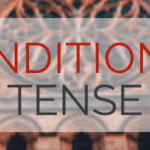
Three common French –oir verbs are verbs of ability: devoir (“must” or “need to”), pouvoir (“to be capable of”), and vouloir (“to want”).
Why learn these French –oir verbs together?
Devoir, pouvoir, and vouloir are closely connected concepts in French and also follow the same conjugation patterns. They are often taught together for efficiency, and learning them this way also allows students to recognize the subtle distinctions between the meanings of each of these verbs.
Unless stated otherwise, we’re always talking about the present tense of these –oir verbs in this section.
1) DEVOIR
First, Devoir generally reflects duties, expectations, or obligations (a mnemonic is “d” for “duty and debt”). There are three main uses of devoir:
OBLIGATION AND RESPONSIBILITY
Things one must do or should do, used with devoir (conjugated) + infinitive. For example:
Je dois finir le ménage. (“I must finish the housework.”)
EVENTS THAT ARE “SUPPOSED TO” HAPPEN
The expectation that a future event should occur, also conjugated with an infinitive. For example:
Bennett doit revenir bientôt. (“Bennett is supposed to return soon.”)
OWING DEBT
An active verb reflecting that someone owes another party something. For example:
Il nous doit dix dollars. (“He owes us ten dollars.”)
Also notice about that there is no clear distinction between the concepts of “must” versus “should” in French.
2) POUVOIR
Next, pouvoir reflects the concepts of having the capability or permission to do something. These two uses are:
“CAN” AND “MAY”
Pouvoir is used in cases where you would say in English that someone both “can” do something or that not only can they, they “may.” There is often not a strong distinction between the two concepts in French.
For example:
Vous pouvez commander un autre dessert.. (“You can order another dessert.”)
Ils peuvent poser une question. (“They may ask a question.”)
“COULD” REQUESTS
To increase the politeness of a request, you can use the conditional form of pouvoir to create “could”. For example:
Est-ce que je pourrais emprunter un manteau? (“Could I borrow a coat?”)
In both cases, the conjugated form of pouvoir would be followed by an infinitive.
3) VOULOIR
Finally, vouloir generally reflects one’s desires and wishes, both in terms of desired events and in desired people or objects.
WANTING
The most direct translation of someone “wanting” something is to use vouloir in the present indicative tense.
You can use vouloir with direct objects or with infinitives. For example:
Je veux des nouveaux talons rouges. (“I want some new red high heels.”)
Nous voulons voir le match. (“We want to see the game.”
“WOULD LIKE”
As with pouvoir, using the conditional tense for vouloir elevates the politeness of the desire.
As with the present tense version, you can use vouloir with direct objects or with infinitives. For example:
Je voudrais une nouvelle chemise, s’il vous plaît. (“I would like a new shirt, please.”)
Il voudrait vous présenter ses excuses. (“He would like to offer you his apologies.”)
FORMAL “PLEASE”
An interesting use of vouloir is with the imperative vous form, veuillez, which is a polite way of requesting that someone please do something. It is used with an infinitive.
It is often used in formal written letters and in correspondence such as event invitations. For example:
Veuillez accepter nos excuses pour cette erreur. (“Please accept our apologies for this mistake.”)
How to Conjugate French -oir verbs Devoir, Pouvoir, and Vouloir
You should prioritize learning these three verbs in the present indicative and conditional tenses. They are semi-irregular, but the patterns are easy to master. Additionally, learning their past participle forms is quick and will allow you to refer to past events using passé composé.
PRESENT TENSE CONJUGATIONS OF THESE THREE FRENCH -OIR VERBS
Using devoir, pouvoir, and vouloir in the present tense conveys the most straightforward and literal translations from English. The present tense is acceptable in most circumstances, unless you really need to emphasize formality or conditionality in your statement.
As with many irregular verbs in French, the nous and vous forms should be forms should be fairly predictable, and distinct in the “boot” (the je, tu, il/elle, and ils/elles forms).
- For nous and vous, simply take off the –oir ending and add –ons and –ez.
- For each verb the boot has its own base form that you will add –x, -x, -t on the singular side, and the plural third person will have the normal –ent ending.
| devoir | |
| je dois | nous devons |
| tu dois | vous devez |
| il doit | ils doivent |
| pouvoir | |
| je peux | nous pouvons |
| tu peux | vous pouvez |
| il peut | ils peuvent |
| vouloir | |
| je veux | nous voulons |
| tu veux | vous voulez |
| il veut | ils veulent |
CONDITIONAL TENSE CONJUGATIONS OF THESE THREE FRENCH -OIR VERBS
In many instances, using the conditional present tense for these three verbs connotes greater politeness and formality.
The conditional conjugations for these three verbs have irregular root forms, but all their verb endings follow the standard conditional tense pattern.
| devoir | |
| je devrais | nous devrions |
| tu devrais | vous devriez |
| il devrait | ils devraient |
| pouvoir | |
| je pourrais | nous pourrions |
| tu pourrais | vous pourriez |
| il pourrait | ils veulent |
| vouloir | |
| je voudrais | nous voudrions |
| tu voudrais | vous voudriez |
| il voudrait | ils voudraient |
PAST PARTICIPLES OF THESE FRENCH -OIR VERBS
Finally, you’ll need to know the past participles of these three verbs to form compound verb structures like the passé composé and plus-que-parfait.
All three of these verbs are normal action verbs conjugated with avoir + their past participle form.
- devoir → du
- pouvoir → pu
- vouloir → voulu (if that’s surprising to you, remember that the past participle of voir is vu, so vouloir has to have a different past participle)
Next Steps
You now know everything you need to conjugate devoir, pouvoir, and vouloir in the most common verb tenses you will encounter them in! If you want to master these verbs, you might want to review the future tense and the conditional past.



